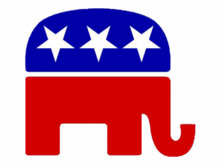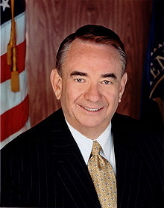GOP Seeks First Grip on Both US Senate Seats in Decades in Florida, Nebraska, North Dakota, Wisconsin
The last time Florida Republicans held both Senate seats was 1875 – the second longest stretch in the nation; Wisconsin (1957), North Dakota (1960), and Nebraska (1976) could also see an end to a decades-long Democratic presence in its state delegations

The GOP has a chance to pick off Democratic seats in several states this cycle, including seven which, if they were successful, would give the party a clean sweep of that state’s U.S. Senate delegation: Florida, Missouri, Nebraska, North Dakota, Ohio, Pennsylvania, and Wisconsin.
For some of these states, however, it has been several decades – to more than a century in one case – since the last time both seats were under control of the Republican Party.
A Smart Politics analysis of U.S. Senate election data finds that Republican pick-ups this November in Florida, Nebraska, North Dakota, and Wisconsin would mark the first time the Party held both Senate seats in these respective state delegations dating back decades and, in Florida’s case, more than a century.
A win by the Republicans in Florida against two-term Democrat Bill Nelson would be one of the biggest coups for the party, which has not held both seats in the Sunshine State since Reconstruction.
Three weeks ago, a Rasmussen poll showed Nelson up by double-digits over the three top Republican contenders – U.S. Representative Connie Mack, former U.S. Senator George LeMieux, and businessman Mike McCalister.
The last pair of Republicans to represent Florida in the Senate was Abijah Gilbert and Simon Conover at the end of Gilbert’s term in March 1875.
The only other state in which Republicans are facing a longer drought in controlling both Senate seats is Louisiana, which last saw GOPers holding both seats in November 1872 (with William Kellogg and J. Rodman West).
Republicans have failed to control both seats for over 100 years in just two other states: Arkansas (March 1885) and Montana (March 1911).
Rounding out the Top 10 longest periods are Rhode Island at #5 (January 1935), Massachusetts at #6 (January 1953), Michigan at #7 (January 1955), Wisconsin at #8 (May 1957), West Virginia at #9 (November 1958), and Connecticut and New Jersey tied at #10 (January 1959).
Hawaii (#12) is the only state never to have been represented by two Republicans in the Senate at the same time, since achieving statehood in August 1959.

The winner of that primary will face Democratic U.S. Representative Tammy Baldwin, who owns one of the most liberal voting records in the nation’s lower legislative chamber.
The last time Republicans held both Senate seats in the Badger State was May 1957 when Alexander Wiley served with Joe McCarthy prior to the latter’s death that month.
Since McCarthy’s death, Democrats went on to win 16 seats against only two losses until Ron Johnson’s upset victory in 2010 over three-term Democrat Russ Feingold.
Republicans are also favored to secure their first lock on both U.S. Senate seats in decades in North Dakota and Nebraska.
North Dakota owns the thirteenth longest stretch in the nation without a GOP-only U.S. Senate delegation at nearly 52 years when Milton Young and Clarence Brunsdale served alongside each other in D.C. in August 1960.
The Peace Garden State’s race this cycle to fill retiring Kent Conrad’s open seat is poised for a matchup between former Democratic state Attorney General Heidi Heitkamp and one-term Republican U.S. Representative Rick Berg.

After a few false starts and flip-flops, former two-term Democratic Senator Bob Kerrey decided to run for his old seat currently held by retiring two-term Democrat Ben Nelson.
Kerrey will square off against insurgent Republican State Senator Deb Fischer, who rallied in the closing days of a Republican primary campaign to defeat state Attorney General and party favorite Jon Bruning in the second closest Nebraska U.S. Senate primary in GOP history.
Republicans also have a chance to hold both Senate seats in three battleground states where they yielded seats in the Election of 2006: Missouri, Ohio, and Pennsylvania.
Fifteen states are currently represented by two Republicans in the Senate: Alabama, Arizona, Georgia, Idaho, Indiana, Kansas, Kentucky, Maine, Mississippi, Oklahoma, South Carolina, Tennessee, Texas, Utah, and Wyoming.
Longest Period Without Republicans Holding Both U.S. Senate Seats by State
|
Rank
|
State
|
Date
|
GOP Senators
|
|
1
|
Louisiana
|
January 1872
|
William Kellogg, J. Rodman West
|
|
2
|
Florida
|
March 1875
|
Abijah Gilbert, Simon Conover
|
|
3
|
Arkansas
|
March 1885
|
Powell Clayton, Stephen Dorsey
|
|
4
|
Montana
|
March 1911
|
Thomas Carter, Joseph Dixon
|
|
5
|
Rhode Island
|
January 1935
|
Jesse Metcalf, Felix Hebert
|
|
6
|
Massachusetts
|
January 1953
|
Leverett Saltonstall, Henry Cabot Lodge, Jr.
|
|
7
|
Michigan
|
January 1955
|
Homer Ferguson, Charles Potter
|
|
8
|
Wisconsin
|
May 1957
|
Alexander Wiley, Joseph McCarthy
|
|
9
|
West Virginia
|
November 1958
|
W. Chapman Revercomb, John Hoblitzell
|
|
10
|
Connecticut
|
January 1959
|
Prescott Bush, William Purtell
|
|
10
|
New Jersey
|
January 1959
|
H. Alexander Smith, Clifford Case
|
|
12
|
Hawaii
|
August 1959
|
(none)
|
|
13
|
North Dakota
|
August 1960
|
Milton Young, Clarence Brunsdale
|
|
14
|
California
|
January 1969
|
Thomas Kuchel, George Murphy
|
|
15
|
Illinois
|
November 1970
|
Charles Percy, Ralph Smith
|
|
16
|
New York
|
January 1971
|
Jacob Javits, Charles Goodell
|
|
17
|
Delaware
|
January 1973
|
J. Caleb Boggs, William Roth
|
|
18
|
Vermont
|
January 1976
|
George Aiken, Robert Stafford
|
|
19
|
Nebraska
|
December 1976
|
Roman Hruska, Carl Curtis
|
|
20
|
Maryland
|
January 1977
|
Charles Mathias, John Beall
|
|
21
|
New Mexico
|
January 1983
|
Pete Domenici, Harrison Schmitt
|
|
22
|
Iowa
|
January 1985
|
Bourke Hickenlooper, Jack Miller
|
|
23
|
Nevada
|
January 1987
|
Paul Laxalt, J. Chic Hecht
|
|
23
|
South Dakota
|
January 1987
|
Larry Pressler, James Abdnor
|
|
23
|
Washington
|
January 1987
|
Slade Gorton, Daniel Evans
|
|
26
|
Minnesota
|
January 1991
|
Dave Durenberger, Rudy Boschwitz
|
|
27
|
Oregon
|
October 1995
|
Mark Hatfield, Bob Packwood
|
|
28
|
Colorado
|
January 2005
|
Ben Nighthorse Campbell, Wayne Allard
|
|
29
|
Missouri
|
January 2007
|
Kit Bond, James Talent
|
|
29
|
Ohio
|
January 2007
|
Mike DeWine, George Voinovich
|
|
29
|
Pennsylvania
|
January 2007
|
Arlen Specter, Rick Santorum
|
|
29
|
Virginia
|
January 2007
|
John Warner, George Allen
|
|
33
|
Alaska
|
January 2009
|
Ted Stevens, Lisa Murkowski
|
|
33
|
New Hampshire
|
January 2009
|
Judd Gregg, John Sununu
|
|
33
|
North Carolina
|
January 2009
|
Elizabeth Dole, Richard Burr
|
|
36
|
Alabama
|
Current
|
Richard Shelby, Jeff Sessions
|
|
36
|
Arizona
|
Current
|
John McCain, Jon Kyl
|
|
36
|
Georgia
|
Current
|
Saxby Chambliss, Johnny Isakson
|
|
36
|
Idaho
|
Current
|
Mike Crapo, Jim Risch
|
|
36
|
Indiana
|
Current
|
Dick Lugar, Dan Coats
|
|
36
|
Kansas
|
Current
|
Pat Roberts, Jerry Moran
|
|
36
|
Kentucky
|
Current
|
Mitch McConnell, Rand Paul
|
|
36
|
Maine
|
Current
|
Olympia Snowe, Susan Collins
|
|
36
|
Mississippi
|
Current
|
Thad Cochran, Roger Wicker
|
|
36
|
Oklahoma
|
Current
|
James Inhofe, Tom Coburn
|
|
36
|
South Carolina
|
Current
|
Lindsey Graham, Jim DeMint
|
|
36
|
Tennessee
|
Current
|
Lamar Alexander, Bob Corker
|
|
36
|
Texas
|
Current
|
Kay Bailey Hutchison, John Cornyn
|
|
36
|
Utah
|
Current
|
Orrin Hatch, Mike Lee
|
|
36
|
Wyoming
|
Current
|
Mike Enzi, John Barrasso
|
Data compiled by Smart Politics.
Follow Smart Politics on Twitter.

Richly informative and interestsing.